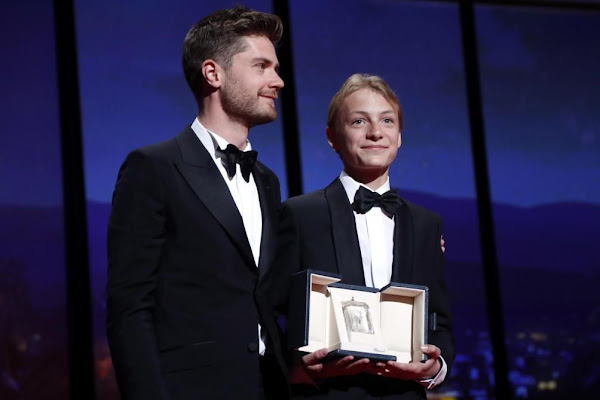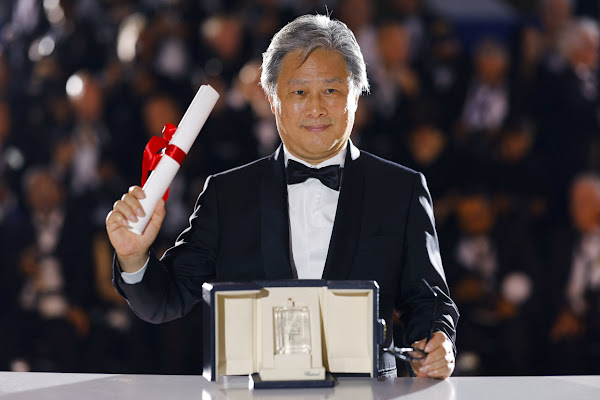Vive la Suède - Ruben Östlund wins his second Palme d'Or at Cannes
By Moira Jean Sullivan
It was perplexing to listen to Ruben Östlund accept his second Palme d’Or. As he said at the press conference after the closing ceremony, it could be a mistake the first time, but the second time it is is probably not. Not everyone agreed it was the best film this year nor one of the films expected to win. However, the entire sound team - Andreas Franck, Bent Holm, Jacob Ilgner and Jonas Rudels won the Vulcan award - Prix Vulcain de l’Artiste Technicien - awarded by the Superior Technical Commission of Image and Sound. Östlund latest films such as The Square (2017) embrace the absurdity of politics by a director from a multi-party social democratic country. Sweden's has shifted from left to right in the past few years ending years of neutrality to be a part of NATO. Currently the leading party is the Social Democrats but with only a third of the seats , with a third shared by the Conservatives (Moderaterna) and a third by the problematic and alarming nationalist party Swedish Democrats. Östlund claims that his films attempt to unite European intelligence with American show business.
Triangle of Sadness, a plastic surgeon term for the procedure involved in the correction of a worry line on the forehead, is centered on appearances. It takes place on a yacht and later what happens to three women who get stranded on a deserted island with billionaires and a Marxist captain (Woody Harrelson). The political rhetoric of the left and the right is used to position the lives of the very rich.
The 75th Cannes Film Festival was full of surprises especially since critics often seem to value their own choices over those made by a real live jury. And this is exactly what happened on May 28. One disturbing element when sitting in the press section of the final awards at Salle Débussy was when (some) journalists loudly booed Grand Prix winner Claire Denis - it could never happen in the Lumière theater with all the dignitaries. But the press does view the festival differently from the actors and filmmakers. Film critics are focused on the films and primarily don’t have time for the Red Carpet events as we are too busy writing our reviews. We are not allowed to take photos from the balcony of the press room and to try to attend a black tie event is difficult since we are busy meeting deadlines. Gala events are dressed up events and when scurrying to so many screenings it can be trying to wear anything but comfortable clothing. So perhaps it is in this spirit that criticism can only be shared among other journalists in the alternative closing ceremony venue. If a woman wins an award other than acting, however, the response can be rabid. Claire Denis was heckled for the Stars at Noon Grand Prix award starring Margaret Qualley - as well as women of color such as Mira Nair (Leon d'Oro Venice for Monsoon Wedding 2001) and Nadine Labaki (Grand Prix Cannes for Capernaum (2017) .
Tying for second place, Claire Denis’ “Stars at Noon” and Lukas Dhont’s “Close” shared the Grand Prix, eliciting boos from the press room. (The heckling continued throughout Denis’ speech, but turned to enthusiastic applause when Belgian director Dhont followed to accept his prize.) Korean director Park Chan-Wook won best director for Decision to Leave, a noir feature that many considered the most technically proficient of the official selection. Lukas Dhont was also considered a favorite for the Palme d'Or with Close and was the lead in jury grids along with Park Chan-wook. Dhont said he had been waiting to make this film a long time about two young boys at school and their friendship that leads to a suicide. The filmmaker remarked at the press conference that a psychology study revealed that young boys describe their relationships with other boys with emotional language but as they get older they view the relationship differently as they become masculinized.Best Screenplay went to Swedish filmmaker Tarik Saleh's Boy From Heaven, Zar Amir-Ebrahimi won Best Actress for her performance in Ali Abbasi’s Danish-Persian crime thriller Holy Spider and Song Kang-ho, won the Best Actor prize in Hirokazu Kore-eda’s film Broker.
Top awards went to Grand Prix recipient Claire Denis and Jury Prix winner Charlotte Vandermeersch, director/adapted script writer with Felix van Groeningenin for Le Otto Montagne (The Eight Mountains - Belgium) - two of five women in the official selection. In Un Certain Regard, a section for new creation in film language, Lise Akoka and Romane Gueret wrote and directed the best film - Les Pires (The Worst Ones - France) about four children selected for parts in a film showing behind the scenes of the production made in a working class neighborhood. Riley Keough and Gina Gammell won the Camera d'Or for their debut feature War Pony with Franklin Sioux Bob and Bill Reddy, also serving as script writers. The film is about two Lakota boys growing up in the Pine Ridge Indian Reservation in South Dakota. Keough met them while filming American Honey directed by Andrea Arnold (2016 - Jury Prize at Cannes).
Movie Magazine International





Comments
Post a Comment